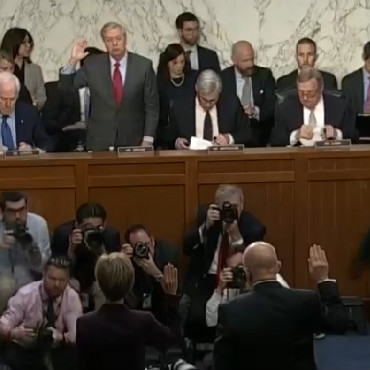DOJ warned Flynn could be blackmailed by Russia
Former Acting Attorney General Sally Yates told the Senate Judiciary Committee she warned the White House on Jan. 26 that then-National Security Advisor Michael Flynn was vulnerable to blackmail by Russia.

Sen. Lindsey Graham (R-S.C.) swears in former Acting Attorney General Sally Yates and James Clapper, former director of the Office of National Intelligence at a May 8 hearing.
Former Acting Attorney General Sally Yates told a Senate panel on May 8 that ex-National Security Advisor Michael Flynn could have been subject to Russian blackmail for misleading the vice president.
Vice President Mike Pence made public statements in January that Flynn told him he did not discuss sanctions with Russian Ambassador Sergey Kislyak, but it was later leaked that Flynn and Kislyak had in fact discussed that subject.
Yates said she warned the White House on Jan. 26 that Russia would have been aware that Flynn misled Pence about the content of his December 2016 conversations with the Russian ambassador.
"You don't want the national security advisor to be in a position where the Russians have leverage over him," Yates told the Senate Judiciary Committee Crime and Terrorism Subcommittee.
Yates met with White House counsel Donald McGahn on Jan. 26 and 27. Yates said she spoke to McGahn again on Jan. 30 to inform him the DOJ would provide access to the underlying evidence that led the department to believe Flynn could be compromised.
President Donald Trump fired Yates that same day for her refusal to support the administration's controversial travel ban. Yates said she was unaware of what transpired after her removal and what actions the White House might have taken to investigate Flynn or limit his access to classified information.
Flynn resigned 18 days later amid the growing controversy over his communications with Kislyak.
Beyond that, there were few new details Yates could reveal about Flynn or any other Trump associates and their connections to Russia. She repeatedly declined to answer questions from senators in the open hearing, saying that the relevant information was either classified or related to ongoing FBI investigations.
Senators tried to pry out of Yates and former Director of National Security James Clapper, who was also at the witness table, the identities of leakers of classified information about Flynn to the press.
The Washington Post reported on Feb. 9 that Flynn had lied about his communications with Kislyak. Yates and Clapper both stated they had not leaked any information about Flynn, nor had they directed anyone to do so.
Clapper also stressed in the hearing that there is a distinction between "unmasking" and leaking. Unmasking, he said, is a routine, legal process whereby someone in the intelligence community asks the collecting agency -- usually the National Security Agency -- to identify a U.S. person captured in surveillance either because of the need for more context, or because the American might be involved in criminal activity.
The collecting agency would review the request and make a determination, and there would be a record of that request with the collecting agency, Clapper said.
Any unmasked information would still remain classified, and therefore leaking it would be a crime, the witnesses added.
Clapper stated that on at least one occasion he requested the unmasking of information about a Trump associate or member of Congress in relation to the 2016 election. Yates stated that she never requested any unmasking.
At one point, however, Yates dropped a possible breadcrumb by stating that details of U.S. persons often are already unmasked by the collecting agency before any intelligence is delivered to other customers, raising the possibility that information about Flynn might not have been masked to begin with.
Subcommittee Chairman Lindsey Graham (R-S.C) asked Clapper for an approximation of how many people in the intelligence community can request unmasking, and Clapper was unable to provide an estimate.
That was one of many questions that remained unanswered at the end of the three-hour hearing, including whether Flynn or any Trump associates were subject to Foreign Intelligence Surveillance Act warrants or whether their communications were simply captured incidentally.
Yates said she could not reveal how it was known that Flynn had been in communication with Russian officials, but she and Clapper both said on several occasions that additional details could be shared with senators in a closed hearing.
The public hearing was broadly focused on Russia's interference in the 2016 presidential election, and on that topic Clapper said the U.S. must do more to prevent future Russian interference.
He said the public needed more education about Russia's propaganda techniques and its proliferation of fake news. In addition, the U.S. government needs to develop better counter-messaging, Clapper argued.
He also said that he supports the controversial decision to declare electoral systems as critical infrastructure. "As a citizen, I'd be concerned with doing all we can to secure that apparatus," he said.





